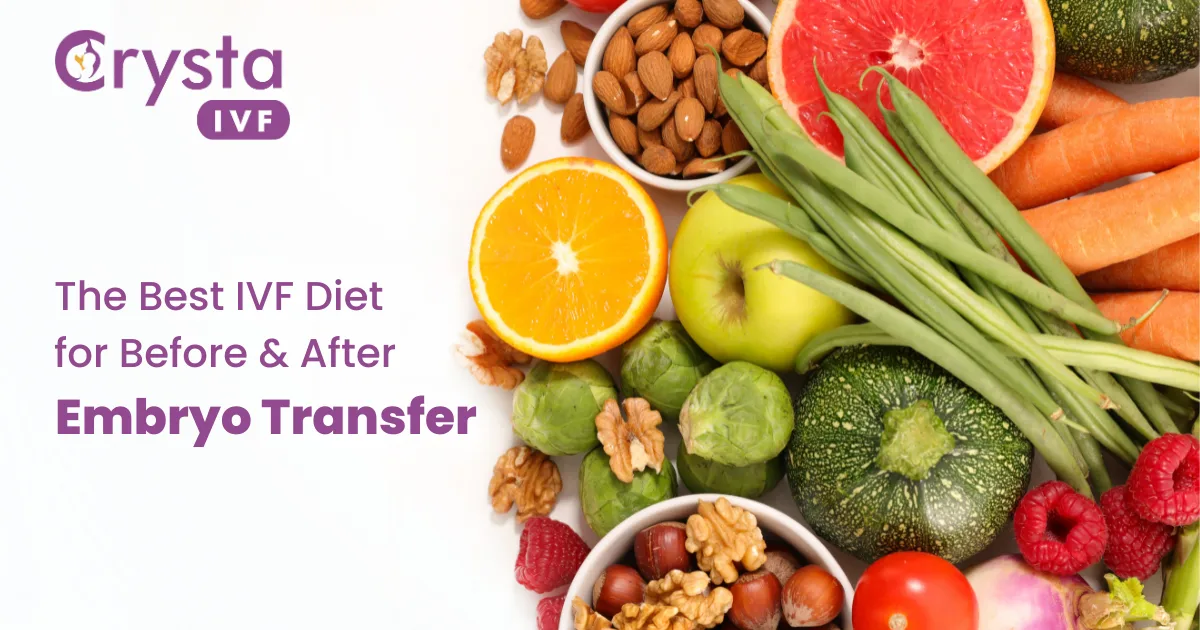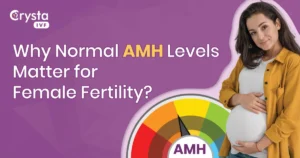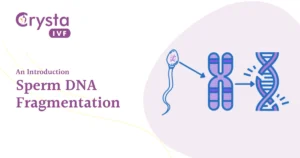
Medically Reviewed By
Dr. Nidhi Sehrawet

After an embryo transfer, every small choice matters, even the food you eat. The right diet can support your body, improve uterine health, and boost the chances of implantation, while the wrong foods may interfere with recovery or hormone balance.
Knowing which foods to eat and which to avoid after embryo transfer helps reduce stress, keeps your body nourished, and gives the embryo the best chance to attach successfully.
But before continuing with planning, it is also vital to know why it is essential to maintain a healthy diet to achieve success in IVF pregnancy. So let’s get started with this comprehensive guide and join in the battle to fight infertility complications together.
Why Does the Diet Chart Matter After Embryo Transfer?
The embryo transfer procedure is the last one of In vitro fertilisation and the most important one. Hence, what you eat after an embryo transfer can make a real difference to your body and your IVF journey.
Here are some reasons why a diet chart matters after embryo transfer:
- Supports implantation: Healthy foods provide nutrients that help the embryo attach to the uterus.
- Balances hormones: A good diet keeps your hormones steady, which is important for early pregnancy.
- Boosts overall health: Nutritious meals keep your body strong and improve recovery after the IVF process.
- Prevents discomfort: Avoiding heavy or junk food helps reduce bloating, gas, or indigestion.
Doctor’s Tip: “A fertility-friendly diet may not guarantee pregnancy, but it helps prepare your body and increases your chances of a positive outcome after embryo transfer.”
What to eat and avoid after IVF: A detailed analysis
What to Eat and Avoid After IVF After Embryo Transfer: A Detailed Analysis
The correct answer still needs to be found with so many ongoing debates. But with the help of nutritionists, fertility experts, and dietary guidelines, the right diet plan can be planned!
| Foods to Eat After Embryo Transfer | Foods to Avoid After Embryo Transfer |
| Fresh fruits (apples, bananas, berries) | Papaya & pineapple in excess |
| Green leafy veggies (spinach, broccoli) | Processed/junk food (burgers, chips, sodas) |
| Whole grains (oats, brown rice, whole wheat roti) | Too much caffeine (coffee, energy drinks) |
| Protein-rich foods (lentils, eggs, paneer, fish, lean chicken) | Raw/undercooked meat, fish, or eggs |
| Dairy (milk, curd, paneer, cheese) | Unpasteurized dairy products |
| Nuts & seeds (almonds, walnuts, chia seeds) | Very spicy or oily food (causes acidity/gas) |
| Healthy drinks (coconut water, herbal teas) | Alcohol & smoking (strictly avoid) |
| Plenty of water (stay hydrated) | Sugary drinks & carbonated beverages |
7 Foods to Eat After Embryo Transfer
There are certain nutrients that women going through an IVF pregnancy must not forget to include in their diet after embryo transfer, such as:
1. Iron
The first and foremost function of iron in your body is haemoglobin synthesis. It is required for the right proportion of oxygenation and the overall functioning of each body tissue, including but not limited to our reproductive system. If not maintained, its deficiency leads to anaemia. Studies show that women are more prone to iron deficiency, so it is better to include pumpkin seeds, spinach, beetroot, carrots, jaggery, etc.
2. Zinc
Many women are still confused about whether they need zinc, for which their bubble needs to burst! Zinc is necessary to balance your hormone levels, which is vital for the reproductive process. The foods you should include in your diet that contain zinc are nuts, grains, dairy products, potatoes, and meat. However, you can also take zinc supplements after consulting with your fertility expert.
3. Folic Acid
You must include folic acid in your diet after embryo transfer. Folic acid is required for a baby’s normal brain and spinal cord development. When not included in the diet, it can lead to neural tube birth defects in a baby. So include green leafy vegetables, rice, beans, legumes, eggs, asparagus, and citrus fruits.
4. Healthy fats
Fats serve as energy storage in the body, which helps boost your energy during the long IVF journey. Studies have suggested that polyunsaturated fatty acids may improve fertility and oocyte and embryo quality, while trans fats adversely affect fertility by increasing insulin resistance. Healthy fat sources include fish, walnuts, olive oil, chia seeds, and flaxseed oil. Women should avoid cookies, cakes, frozen pies, snacks, fast food, and other baked goods. These are all rich in trans fat, which adversely affects pregnancy.
5. Protein-rich food
Proteins are identified as the building blocks of the body and are essential for the growth of babies. Good protein sources for food after the embryo transfer is fish, tofu, beans, cheese, milk, nuts, legumes, and sprouts. However, you should remember that red meat and egg consumption should always be in moderation.
6. Fruits and vegetables
These are the most important sources of antioxidants and help detoxify your body. And are one of the much-needed foods to include in your list of foods to eat after embryo transfer. Vegetables include spinach, citrus fruits, beans, peas, avocados, broccoli, and fruits such as bananas, oranges, berries, dates, sprouts, pineapple, and broccoli, which help you attain a healthy pregnancy.
7. Oral fluids
Water is required to maintain the hydration of the body and to –
- Boost the immune system.
- Remove the impurity from the blood.
- Thickens the uterine wall and prepares a woman’s uterus
- Balance hormones
Now that you have finally studied what foods to eat after embryo transfer, it is time to acknowledge the same.
10 Foods to Avoid After Embryo Transfer
While some foods can boost your chances of success, others may do more harm than good by causing infections, hormonal imbalance, or digestive problems. To give your embryo the best chance to stick and grow, it’s important to know which foods to stay away from during this sensitive phase.
- Raw or Undercooked Meat: May contain harmful bacteria that can cause infections and affect implantation.
- Processed or Junk Foods: High in unhealthy fats and preservatives that can disturb hormone balance.
- High-Mercury Fish (like tuna, swordfish): Mercury can harm fertility and early pregnancy development.
- Raw Eggs or Foods with Them (like mayonnaise, desserts): Risk of salmonella infection, which can weaken your body during recovery.
- Unpasteurized Dairy Products: Can carry bacteria like Listeria that may harm implantation.
- Excess Caffeine (coffee, energy drinks): Too much caffeine can affect blood flow to the uterus and reduce IVF success rates.
- Alcohol: Directly lowers fertility chances and can interfere with embryo growth.
- Sugary Foods and Drinks: Spike blood sugar levels, affecting hormone balance and overall fertility health.
- Spicy or Oily Foods: Can cause bloating, acidity, or stomach upset, making you uncomfortable during recovery.
- Soy-rich Foods (in excess): May affect estrogen balance in some women and disturb hormonal health.
Daily Diet Plan After Embryo Transfer
Eating the right foods after embryo transfer can give your body the strength it needs and create a healthy environment for the embryo to implant.
Here’s a simple one-day sample diet plan that balances protein, fibre, vitamins, and hydration:
| Meal Time | Food Choices | Benefits |
| Breakfast | Oatmeal with nuts & fresh fruits + a glass of milk | Provides protein, fibre, and calcium for energy and strength |
| Lunch | Brown rice, dal, grilled vegetables, curd | Balanced carbs + protein + probiotics for digestion |
| Snack | Handful of almonds & coconut water | Boosts energy, hydration, and healthy fats |
| Dinner | Whole grain roti, paneer/tofu curry, fresh salad | Rich in protein, fiber, and essential nutrients |
| Before Bed | Warm turmeric milk | Helps immunity, reduces stress, and promotes good sleep |
Myths vs Facts About Food After Embryo Transfer
When it comes to diet after embryo transfer, many myths can confuse patients. Let’s clear them with real facts:
- Myth 1: Eating pineapple guarantees implantation.
Fact: Pineapple contains bromelain, which may help with inflammation, but no food alone can guarantee pregnancy. A balanced diet matters most. - Myth 2: Spicy food causes implantation failure.
Fact: Eating spicy food in moderation does not affect implantation. The only issue is it may cause acidity or stomach discomfort, which you should avoid. - Myth 3: You must eat only “bland and light” food.
Fact: Your body needs a variety of nutrients – proteins, healthy fats, carbs, vitamins, and minerals. Bland food is not necessary unless your doctor advises. - Myth 4: Drinking cold water harms embryo implantation.
Fact: Cold or room temperature water does not affect implantation. What matters is staying hydrated. - Myth 5: You should eat for two right after transfer.
Fact: Overeating can cause bloating and discomfort. What you need is quality nutrition, not extra calories.
Take Away
Pregnancy is a beautiful journey, and to make it successful, you have to do a lot, especially when going for an IVF pregnancy. So, maintain a proper diet after embryo transfer, as it reduces the chances of failure to a great extent.
To consult an IVF doctor, connect with Crysta IVF, the best IVF center in Delhi, with top IVF doctors to reduce the percentage of infertility in India.
FAQs on Foods After Embryo Transfer
What should I eat immediately after embryo transfer?
You must eat light, healthy, and balanced meals like fruits, vegetables, whole grains, nuts, and lean protein and avoid oily or heavy food after embryo transfer.
Is milk good after embryo transfer?
Yes, milk is good after embryo transfer. It is safe and provides calcium and protein. Choose warm milk instead of very cold milk.
Can I eat eggs after embryo transfer?
Yes, you can eat eggs after embryo transfer. Eggs are rich in protein and vitamins and must be taken in appropriate amounts.
Can I drink coffee after an embryo transfer?
No, excess coffee after embryo transfer is not beneficial. One small cup a day is usually okay, but too much caffeine may affect implantation.
Is pineapple safe after embryo transfer?
No, pineapple is not recommended after embryo transfer. Eating a small amount is fine, but don’t overeat. Pineapple does not guarantee implantation success.
Should I avoid spicy food after embryo transfer?
Yes, avoid too much spicy food. It doesn’t harm the embryo, but it can cause gas, acidity, or stomach upset.
Can I eat curd after embryo transfer?
Yes, curd is safe and good for digestion as it has probiotics.
How to help an embryo attach to the uterus naturally?
To help an embryo attach to the uterus naturally, you must stay stress-free, eat a balanced diet, stay hydrated, avoid smoking/alcohol, get enough rest, and follow your doctor’s advice.




